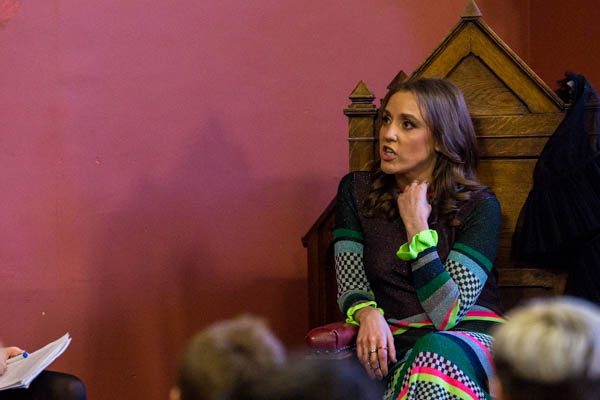
It is never a good idea to compare “your insides to everyone else’s outsides”. This is a great take-home message for the virtually all-female crowd that packed out the chamber of the Graduate’s Memorial Building (GMB) last night, to hear the musings of the acclaimed author, ardent feminist and Trinity alumnus Louise O’Neill.
The event was co-hosted by Dublin University Gender Equality Society (DUGES, also fondly known as FemSoc) and Trinity Literary Society (LitSoc), with Ciara Hamilton and Deirbhile Brennan, the respective society chairs, conducting the interview. Their well-researched questions steered the conversation from difficult to light-hearted territories with ease, as O’Neill touched on topics as diverse as rape, eating disorders, her writing, her influences, critical reception of her work, her teenage experience, her readership, the patriarchy and which fairytale princess she would bring to a desert island. O’Neill was refreshingly honest throughout the discussion. The interviewers described her as a “champion of feminism with a razor for a pen”. O’Neill speaks out about women’s issues through her novels, Twitter presence, and a weekly column in the Irish Examiner.
A trigger warning was provided at the beginning of the talk – and for good reason, as it was difficult to listen to O’Neill’s accounts of her struggles with eating disorders. She has suffered from bulimia and anorexia on and off since she was 14, and now at 32 she’s “still in recovery”, having lost “much of my youth and twenties” to the disorders. She spoke frankly about the period in her early twenties when she worked for the fashion magazine Elle in New York as a stylist and fashion buyer, and how this experience exacerbated her problems.
O’Neill studied English at Trinity and has published two novels for young adults. Only Ever Yours is a chillingly plausible dystopian narrative, while Asking For It engages with the issues surrounding rape culture, and is overtly topical in the context of the Paddy Jackson trial currently making headlines in the Irish news. She is disheartened by how the novel remains so relevant, three years after its publication – “we shouldn’t still be having this conversation in 2018”. Things are changing though – she sees a “shift in how much people are willing to tolerate”, as they “are getting more angry”. O’Neill insists that “we need to keep pushing forward” despite the “historical backlash” faced by feminists.
She spoke at length about the particular “monocultural” small town experience she had growing up in Clonakilty, Co Cork, and of the difficulties she faced attending an all-girls convent secondary school, where she “felt constantly afraid”. She acknowledges it could have been worse, saying her gay peers were “like social pariahs”. This environment made it “hard to be different”, or to speak out about problems. Trinity was a much more positive environment for her, however – upon coming to college she felt “freer”, like she could be a “more authentic” version of herself.
Her work to date engages strongly with feminist issues, and her upcoming offerings are no different. In March, she will release her first novel for adults, Almost Love, which deals with the complexities of all-consuming love and battling to be an individual within the confines of an adult heterosexual relationship. Of the novel, she says that writing for adults provided her with a “new challenge”. O’Neill didn’t consciously set out to be a young adult fiction writer – as she says, she “wasn’t concerned with the end audience of her work”, but “only the story”. When writing young adult fiction, she has grown accustomed to writing in the first-person present tense which provides an “immediacy”, which she feels is reflective of teen experience. In Almost Love, she experiments with tenses and modes of narrative, with a third-person narrator providing a detachment that’s new to her. The novel contains “now” and “then” sections, swapping between time frames. O’Neill is clearly proud of the work, as she says “Sarah is probably the most complicated protagonist I’ve ever created.”
In May, O’Neill’s feminist retelling of The Little Mermaid, entitled The Surface Breaks, will be released. Ariel is the princess she would bring to a desert island, as she related to her in “feeling trapped but also longing for more” throughout her life. She spent part of her childhood living beside the sea, feeling like she was “half child, half sea creature” – she was “really obsessed” with the Disney movie when it came out. Her Ariel is a “less passive, more vulnerable, more complex” mermaid who is “less of a pushover”. She was thrilled to be gifted with a canvas tote bag decorated with a mermaid and the words “Love, Trinity Literary Feminists” at the end of the talk, and was happy to call the female Trinity audience her dates for Galentine’s Day.






